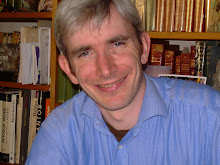 The picture above shows a detail of the Greater Cornea Housing Development Project. It was conceived in conjunction with the huge Gondwanaland Theme Park Project which, in turn, was funded by an International Syndicate with the full support of the former Grand Duke. Both projects were cancelled once the Grand Duke was deposed - but a lot of damage had been done to the landscape and to the economy of this once prosperous province.
The picture above shows a detail of the Greater Cornea Housing Development Project. It was conceived in conjunction with the huge Gondwanaland Theme Park Project which, in turn, was funded by an International Syndicate with the full support of the former Grand Duke. Both projects were cancelled once the Grand Duke was deposed - but a lot of damage had been done to the landscape and to the economy of this once prosperous province. As the reader discovers at the end of the (as yet unpublished) third volume of Chronicles of the Greater Dream, Miguel himself reached Lavena some time after the events he relates. He later joined us on a state visit to the Province of Cornea, whose tyrannical Grand Duke had just then been deposed. During this visit, he and the new Prime Minister of the province had an interesting conversation :
“We dined that evening with the young Grand Duke. The Prime Minister, as we learned, is an outstanding historian, and while his scholarly work had never been appreciated by the Grand Duke, his real troubles only began after he published a short story entitled The Service Station.
As summarized for our benefit by the author, the story relates the misadventures of a young man called Omee, who sets out to visit his girl friend in a neighboring town. He stops off at a service station on the freeway, but when he wants to leave again, he is told that the road has momentarily been closed, and that he will have to wait.
The wait goes on and on. Night comes, day returns, a week passes, then a month; more and more people keep turning into the service station and are unable to leave, and the service station itself, in which all these stranded people bed down like campers, keeps growing until it reaches the monstrous proportions of the Grand Duke’s palace.
Since these people can’t go anywhere, they must find ways of paying their keep. They are hired by the service station manager to clean up, serve food, watch and spy on one another, and even arrest, judge and incarcerate one another. They must also be fed, of course, and since the service station bar serves only junk food, that’s all they get. The men soon begin to crave company, and the accommodating manager brings in a busload of prostitutes, and even shows X-rated films once a week in his office.
The same bus occasionally drives the people to a neighboring fun fair, where they all have a virtual good time, and as days pass, they find their lives turning increasingly upon the contents of the sandwiches they will be served for lunch, the girls with whom they will be able to spend a few minutes in the evening or the roller-coaster ride they plan to take on Friday afternoon.”
“And how does it end?” I asked.
The Prime Minister made a rueful face.
“The end is simple, Mr. Errazu,” he said. “One day, the road is opened again, but none of them know where to go.”
This short narrative, recorded towards the end of Miguel's history, appears suggestive of the spirit in which he wrote the book: as though the whole thing were a metaphor and was meant to remind its readers of the place they had meant to reach when they first set out on their journey.

No comments:
Post a Comment